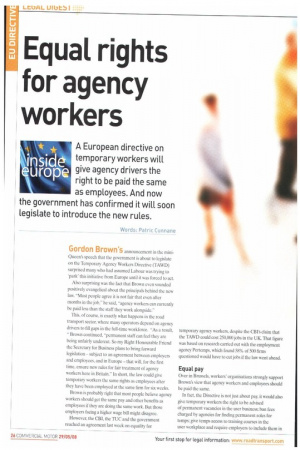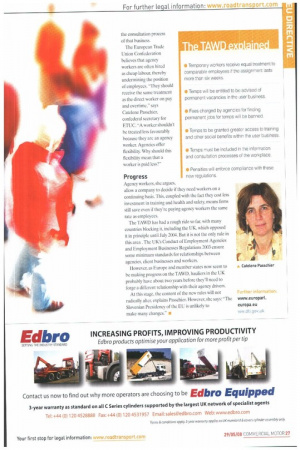Equal rights for agency workers
Page 26

Page 27

If you've noticed an error in this article please click here to report it so we can fix it.
A European directive on temporary workers will give agency drivers the right to be paid the same as employees. And now the government has confirmed it will soon Legislate to introduce the new rules.
Words: Patric Cunnane
Gordon Brown's announcement in the miniQueen's speech that the government is about to legislate on the Temporary Agency Workers Directive (TAWD) surprised many who had assumed Labour was trying to 'park' this initiative from Europe until it was forced to act.
Also surprising was the fact that Brown even sounded positively evangelical about the principals behind the new law. "Most people agree it is not fair that even after months in the job," he said, -agency workers can currently be paid less than the staff they work alongside."
This, of course, is exactly what happens in the road transport sector, where many operators depend on agency drivers to fill gaps in the full-time workforce. "As a result, "Brown continued, "permanent staff can feel they are being unfairly undercut. So my Right Honourable Friend the Secretary for Business plans to bring forward legislation — subject to an agreement between employers and employees, and in Europe — that will, for the first time, ensure new rules for fair treatment of agency workers here in Britain." In short, the law could give temporary workers the same rights as employees after they have been employed at the same finn for six weeks.
Brown is probably right that most people believe agency workers should get the same pay and other benefits as employees if they arc doing the same work. But those employers facing a higher wage bill might disagree.
However, the CBI, the TUC and the government reached an agreement last week on equality for temporary agency workers, despite the CBI's claim that the TAWD could cost 250,000 jobs in the UK. That figure was based on research carried out with the employment agency Pertemps, which found 58% of 500 firms questioned would have to cut jobs if the law went ahead.
Equal pay
Over in Brussels, workers' organisations strongly support Brown's view that agency workers and employees should be paid the same.
In fact, the Directive is not just about pay, it would also give temporary workers the right to be advised of permanent vacancies in the user business; ban fees charged by agencies for finding permanent roles for temps; give temps access to training courses in the user workplace and require employers to include them in the consultation process of that business.
The European Trade Union Confederation believes that agency workers are often hired as cheap labour, thereby undermining the position of employees. "They should receive the same treatment as the direct worker on pay and overtime," says Catelene Passchier, confederal secretary for ETUC. -A worker shouldn't be treated less favourably because they are an agency worker. Agencies offer flexibility. Why should this flexibility mean that a worker is paid less?"
Progress new regulations. Agency workers, she argues, allow a company to decide if they need workers on a continuing basis. This, coupled with the fact they cost less investment in training and health and safety, means firms still save even if they're paying agency workers the same rate as employees.
The TAWD has had a rough ride so far, with many countries blocking it, including the UK, which opposed it in principle until July 2004. But it is not the only rule in this area . The UK's Conduct of Employment Agencies and Employment Businesses Regulations 2003 ensure some minimum standards for relationships between agencies, client businesses and workers.
However, as Europe and member states now seem to be making progress on the TAWD, hauliers in the UK probably have about two years before they'll need to forge a different relationship with their agency drivers.
At this stage, the content of the new rules will not tie radically alter, explains Passchier. However, she says: "The www.europarl.
Slovenian Presidency of the EL: is unlikely to europa.eu make many changes." • ww.uti.gov.uk




































































































































































